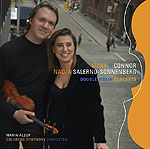
High-class fiddlin'
|
This review first appeared in Turbula in July 2005.
Best known as a country fiddler – one of the most in-demand fiddlers in Nashville for most of the 1980s and '90s – Mark O'Connor in fact possesses an all-encompassing thirst for music that has taken him into jazz and rock as well. And his most recent project continues a recent exploration of classical music, with O'Connor paired with fellow violinst Nadja Salerno-Sonnenberg and the Colorado Symphony Orchestra for several of his own compositions – including his new "Double Violin Concerto."
O'Connor (who nowadays hangs his hat in Bonsall) writes in the liner notes that the concerto is his third symphonic work, following "The Fiddle Concerto" and "Three Pieces for Violin and Orchestra." While scored orchestrally, the concerto is heavily influenced by jazz – particularly the first two movements, "Swing" and "Midnight on the Dance Room Floor" where the European strains of Django Rheinhardt and former O'Connor mentor Stephane Grappelli are joined to the spirit of American composers Copland and Ellington. The third movement, "Dixieland," moves into more of a New Orleans vein, with some country-western flourishes as well. Throughout, O'Connor distills all the musical influences of his life into something that is immediately American.
In addition to the new concerto, two previous O'Connor projects originally recorded in small-combo or folk environments receive full orchestral treatments here. "Appalachian Waltz" was originally recorded on the CD of the same name O'Connor did in 1996 with cellist Yo-Yo Ma and bassist Edgar Meyer. And the "Johnny Appleseed Suite," a four-movement piece, was originally done in a folk vein with Garrison Keillor providing the narration.
Salerno-Sonnenberg's second violin is partner to O'Connor's own playing – an equal voice, and one that fleshes out O'Connor's populist style with a more classical approach. It is a dual virtuosity, and the two clearly have a musical empathy that allows them to complement one another.
The overall result is a beautiful album, one a little different from O'Connor's typical output – but close enough to the Appalachian series he did with Ma and Meyer that fans of those releases are likely to enjoy this as well.
